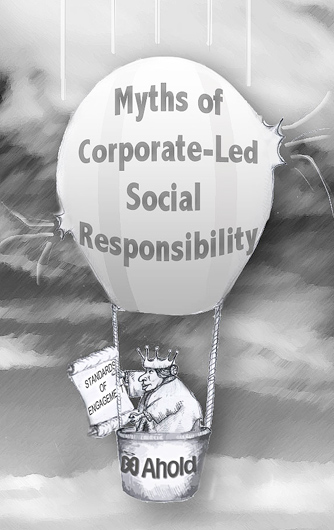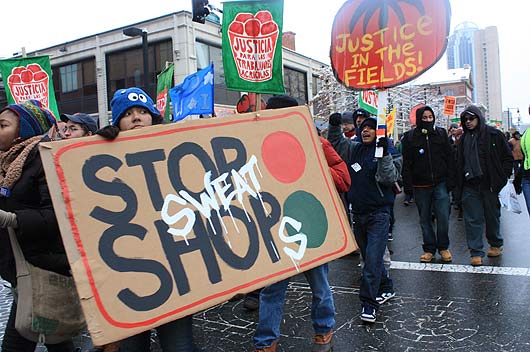
Myth #2: The market price, by definition, is a “fair price”
It is time, again, to return to our our continuing series, “The Three Founding Myths of Corporate-Led Social Responsibility,” the series we began in response to Ahold’s statement on the Campaign for Fair Food, issued in the run up to its recent shareholders’ meeting in Amsterdam.
When we launched the series, we wrote:
Yet Ahold, at its annual shareholders’ meeting in Amsterdam last week, stubbornly held the line on the old school, form-over-substance model of corporate accountability. Once again, Ahold refused to participate in the the Fair Food Program and instead doubled down on the myths of corporate-led social responsibility that are losing credibility like a hot air balloon that has sprung a leak and is sinking back to earth.And like that balloon, the only question left to answer now for Ahold is how hard the landing is going to be.
Our first post, Myth #1: Standards, without resources or mechanisms sufficient to enforce them, are adequate to respect and protect human rights in the supply chain, poked the first hole in that balloon, and the second is now on its way. So, here below follows our second post in the three-part series, Myth #2: The market price is, by definition, a fair price.”
Fair for whom? Even Ahold seems confused…
When you are talking about price, the word “fair” is decidedly in the eye of the beholder. But, interestingly, when Ahold talks about a “fair” price, it talks out of both sides of its mouth.
On the one hand, there is Ahold the staunch proponent of all things Fair Trade. Here’s a quotation from an Ahold press release from 2004, when one of Ahold’s US-based chains, Giant Food, entered into an important new relationship with Transfair, the Fair Trade certification organization:
The Need for Fair Trade Certification: Over the past five years, the world market price for coffee has fallen 70%. Last year, prices dipped to their lowest ever, creating a crisis for 25 million farmers around the world who depend on coffee for their livelihood. Today, most small farmers are unable to cover their production costs or provide a decent living for their families.By selling their coffee under internationally accepted Fair Trade standards, family farmers are guaranteed a fair price. Fair Trade helps farmers to bootstrap their way out of desperate poverty.” read more >>
Here, the meaning of the words “fair price” couldn’t be clearer: A price, higher than the market price, capable of reversing the damage caused by the existing unequal market relationship between large, consolidated coffee buyers and small family coffee growers — an inequality that drove coffee prices to an unsustainable low and farmers into an existential crisis. In light of that crisis, Ahold feels it is necessary to pay a Fair Trade price, which includes a premiumover the market price, to help farmers “bootstrap their way out of desperate poverty.”
Ahold redoubled its commitment to Fair Trade when, in 2009, it launched its private “Puur & Eerlijk” (pure & honest) brand, which includes a foundational commitment to Fair Trade. From the release announcing the brand:
Fairtrade: Fairtrade products have been purchased for an honest price and produced on farms in developing countries under internationally recognized fairtrade conditions. This increases the possibility for better living conditions for farmers and their families. Max Havelaar’s inspection label, which will be found on all of the AH pure & honest fairtrade products, guarantees that the product has been sourced and produced according to international fairtrade conditions.” read more
So Ahold’s Fair Trade credentials are impeccable. A “fair” price — nay, “honest” price — is one that reverses the downward pressure on producer prices driven by unfettered market forces and undoes the poverty created by unfair market prices. And Ahold is all in.
Or is it? Here are Ahold’s words on “a fair market price,” out the other side of its mouth, from the company’s statement on the Campaign for Fair Food:
The CIW has asked Ahold USA to agree to pay a penny-per-pound to tomato workers under the CIW program. We will continue to pay a fair market price for tomatoes from suppliers who are in compliance with our Standards of Engagement, but Ahold USA will not enter into direct wage negotiations with suppliers’ employees. Ahold USA will not, therefore, participate directly with the suppliers’ employees in CIW’s penny-a-pound program.” read more
Before getting into the meat of Ahold’s statement, let’s dispense with one thing from the start that might cause some confusion: No one is asking Ahold to “enter into direct wage negotiations with suppliers’ employees.” This is a red herring taken directly from the pages of Publix’s playbook. By signing a Fair Food agreement, Ahold would no more be entering into “direct wage negotiations with suppliers’ employees” than it did when Ahold signed its agreement with Transfair to buy Fair Trade coffee from small family coffee farmers.
Now, that aside, what does Ahold mean when it talks about a “fair market price” in relation to the Campaign for Fair Food? It means, ironically, the very same unsustainably low price it decries in its pronouncements on Fair Trade, the impossiby low price to growers driven ever lower by Ahold’s constant leveraging of its volume purchasing power. Here are a few descriptions of the volume purchasing mechanism at work from interviews with Ahold representatives:
Baltimore Sun: “It’s one of the first such internationally coordinated promotions of its kind and an effort by Ahold to use its formidable buying power to increase its profit margins and market share, analysts said… ‘That creates a massive promotion for the product and significantly increased volume, and therefore we are in a position to offer local customers a real best buy,’ said Jan Hol, a spokesman for Royal Ahold in the Netherlands. ‘We are really leveraging our international scale.'”
Bloomberg Businessweek: “Peapod negotiates for produce with local markets but is able to leverage Royal Ahold’s purchasing power to demand low prices. By tailoring models to the market, the company says it will achieve operating profitability in all of its markets by year-end.”
Baltimore Sun: “Ahold envisions reining in costs by consolidating functions such as information systems, distribution and buying. By sharing costs on increased volumes of private-label products, the companies could undercut competitors by offering lower prices to restaurant customers or grocery consumers, said Hans Gobes, a spokesman for Royal Ahold in the Netherlands.”
So, to answer the question at the top of this post: Fair for whom? In the case of Fair Trade, Ahold would say fair for the farmers and farmworkers who have been squeezed within an inch of their lives by unfair market forces. But in the case of the Campaign for Fair Food, Ahold would say fair for Ahold, fair by the rules of the unfettered market, where volume purchasing is all in the game, a perfectly legitimate business strategy, to hell with the poverty and abuse it may create.
Speaking of which… Not everyone is as confused as Ahold.
It just so happens that Pope Francis, speaking about the horriffic factory building collapse in Bangladesh that has taken the lives of well over 400 garment workers at last count, has some pretty strong feelings himself on the subject of the unconscionable poverty at the end of multi-national supply chains. Here are his words, from a private mass earlier this week:
A headline that really struck me on the day of the tragedy in Bangladesh was ‘Living on 38 euros a month’. That is what the people who died were being paid. This is called slave labour,” the pope was quoted as saying at a private mass.”Today in the world this slavery is being committed against something beautiful that God has given us — the capacity to create, to work, to have dignity. How many brothers and sisters find themselves in this situation!” he said.”Not paying fairly, not giving a job because you are only looking at balance sheets, only looking at how to make a profit. That goes against God!” read more >>
Pope Francis’ words are as powerful as any in recent memory from the Vatican on labor, and they are refreshingly frank.
Ahold can be a socially responsible company that takes real, effective measures to mitigate the damage caused by its purchasing practices, or it can be a company that leverages its buying power to undercut the competition and maximize profit by cutting costs. But it can’t be both.

A market price can’t be called “fair” when that price condemns workers to a life of poverty wages and abusive, dangerous working conditions. Poverty, sexual harassment, forced labor — those are human rights violations that no buyer of goods produced in those conditions can ignore. Rather, it is incumbent on companies like Ahold that buy products in exploitative conditions to know about those conditions and to help fix them. And that is especially true when a respected, established, successful program like the Fair Food Program is already hard at work addressing the problems and needs the buyers’ help to finish the job.
We’ll close today with the words of another authority on the question, this time the United Nations, birthplace of the Universal Declaration of Human Rights in 1948, in the wake of World War Two and its attendant horrors. Today, the United Nations Office of the High Commissioner on Human Rights continues the work of education and vigilance necessary to protect those rights, and in the realm of the marketplace, its Guiding Principles on Business and Human Rights provide unambiguous counsel for corporations seeking the proper path:
The Corporate Responsibility to Respect Human RightsFoundational PrinciplesBusiness enterprises should respect human rights. This means that they should avoid infringing on the human rights of others and should address adverse human rights impacts with which they are involved…Addressing adverse human rights impacts requires taking adequate measures for their prevention, mitigation and, where appropriate, remediation. read more >>
We will return to the Guiding Principles again soon, with exciting news from last week’s visit to Immokalee from the UN Working Group on Business and Human Rights. Until then, there remains one installment to go in this particular series, on the question: Can corporations be trusted to unilaterally investigate, and to determine any appropriate corrective action, when their suppliers violate their workers’ human rights.
Check back soon…



